
Authors: Jack McCarthy, Colman McCarthy, Carlos Pablo Sigüenza, Gergo Suto, Colum Gibson, Claire Downey and Adam Boland , July 2024
Year: 2024
Ireland has registered a relatively poor score in terms of the Circular Material Use Rate (CMUR) – a key circular economy metric of the European Union. Ireland’s policy ambitions are to surpass the EU average in this metric by 2030. The aims of the CAIR (a Critical Analysis of Ireland’s circular material use Rate) project were to firstly identify factors driving Ireland’s relatively low CMUR performance and secondly to identify actions through which Ireland’s CMUR score could be improved. The research activities included an interrogation of how the CMUR metrics function, analysis of the data used, a comparison of the data and statistical profile of Ireland with three other Member States, and the development of proposals for improving Irelands CMUR score.
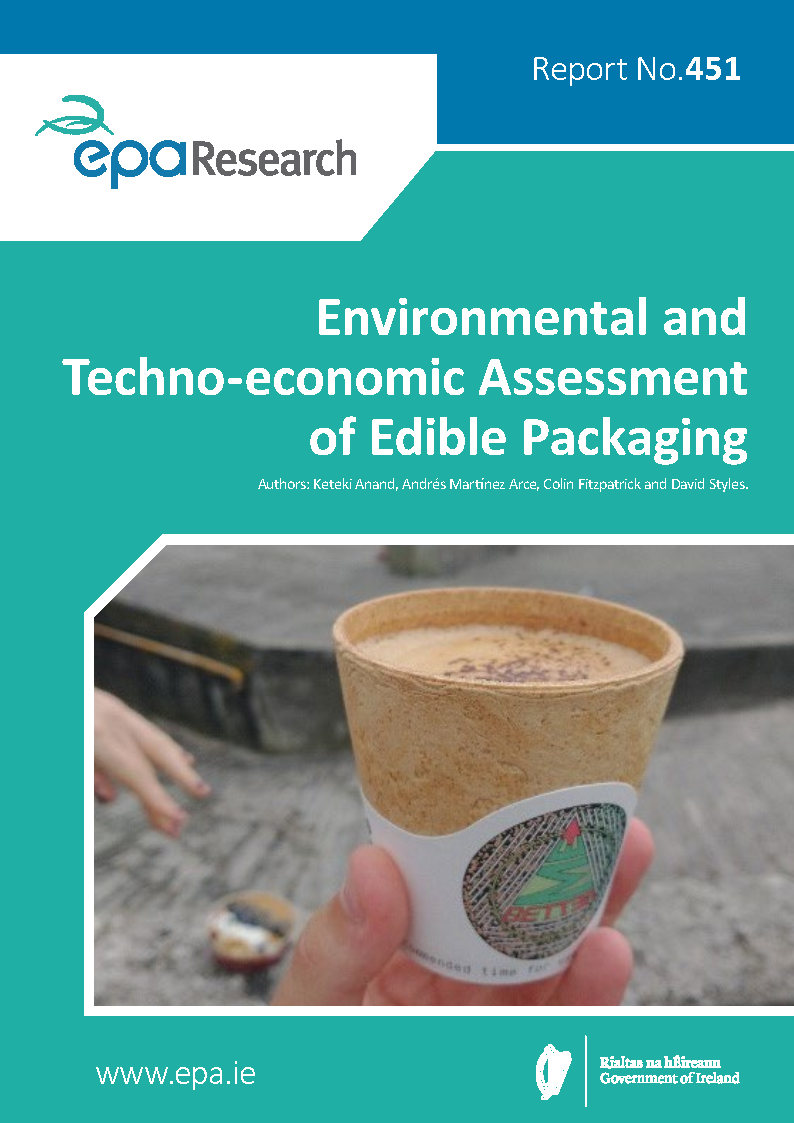
Authors: Keteki Anand, Andrés Martínez Arce, Colin Fitzpatrick and David Styles, March 2024
Year: 2024
It is estimated that 550,000 cups per day are used in the Irish market alone, and that this could increase to an annual total of 300 million cups per year by 2025. Although there is a common perception among consumers that paper cups are recyclable, and thus a sustainable option, this is not necessarily true. These cups are lined with plastic, which is difficult to separate from the paper, and most paper cups are sent to residual waste streams for landfill or incineration. The concept of edible packaging has the potential to help address littering and waste management challenges from single-use disposable cups. EAT-Packaging undertook a life cycle assessment across a range of relevant cup types and engaged with national stakeholders to develop scenarios to identify where, when, and how edible cups (or alternative options) could reduce environmental impact for the functional unit of a cup containing a single drink.

Authors: Colm Gaskin, Ken Stockil, Thomas Track, William Horan, Andres Lucht and Paul Conheady, July 2023
Year: 2023
Industrial activity is intrinsically linked to the accessibility and availability of water. The increasing global demand for industrial water poses a significant risk management challenge for organisations aiming to decouple the growth of production capacity from unsustainable consumption. This report presents a framework for industrial water users to adopt Industrial Water 4.0.
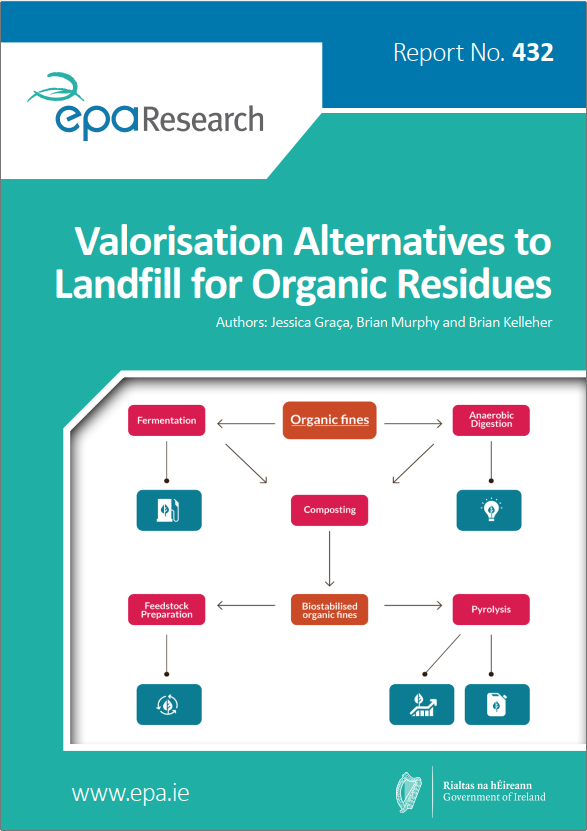
Authors: Jessica Graça, Brian Murphy and Brian Kelleher, May 2023
Year: 2023
The EPA’s latest data (November 2022) show that municipal waste generation increased by over 440,000 tonnes in the last 5 years, and now amounts to 3.2 million tonnes. The VALOR study looked at how the resource value of the mechanically separated organic fraction of municipal solid waste (MS-OFMSW) can be maximised. The study also characterised the organic fractions of municipal solid waste (MSW).
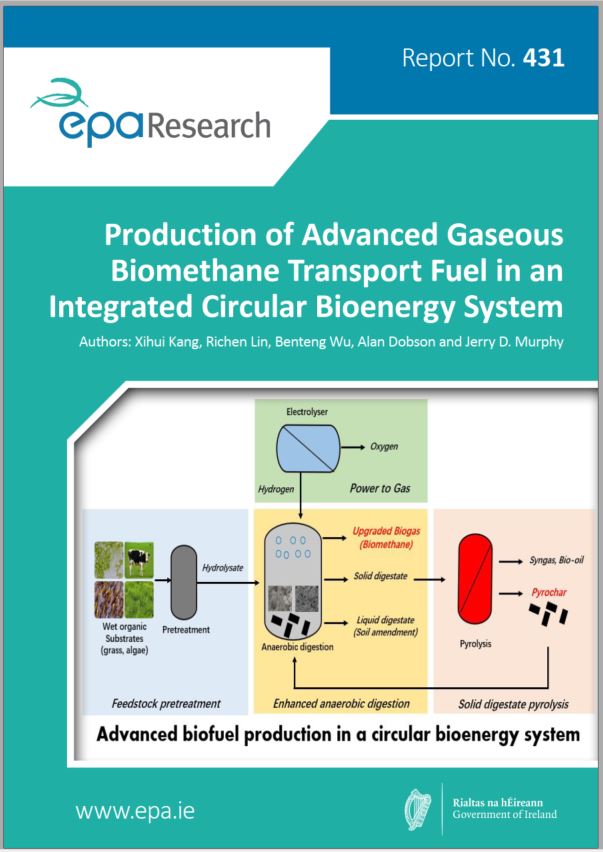
Authors: Xihui Kang, Richen Lin, Benteng Wu, Alan Dobson and Jerry D. Murphy, April 2023
Year: 2023
Transport is by far the largest source of energy-related CO2 emissions in Ireland. This highlights the need for a rapid transition from a linear fossil fuel-based economy to a bio-based economy that treats waste as a commodity, reduces GHG emissions, sequesters carbon and produces biofuels, biofertilisers, and bioproducts. The aim of the Advanced Gaseous Biomethane project was to develop an integrated system that produces biomethane using biomass to fuel the transport sector cleanly and support Ireland in achieving key emissions targets.
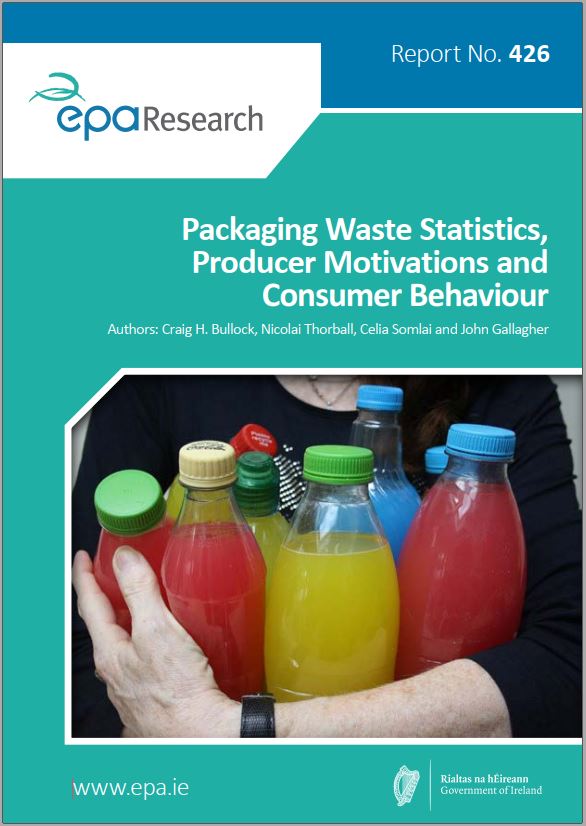
Authors: Craig H. Bullock, Nicolai Thorball, Celia Somlai and John Gallagher, December 2022
Year: 2022
The production of plastic packaging for food and other products has increased substantially over the past 50 years. The ReWrapped project investigated why Ireland’s production of plastic packaging waste appears to be higher than that of other EU Member States. The project also undertook a survey of producers to help understand what drives their use of different types of plastic and the extent to which sustainability considerations influence their decision-making.
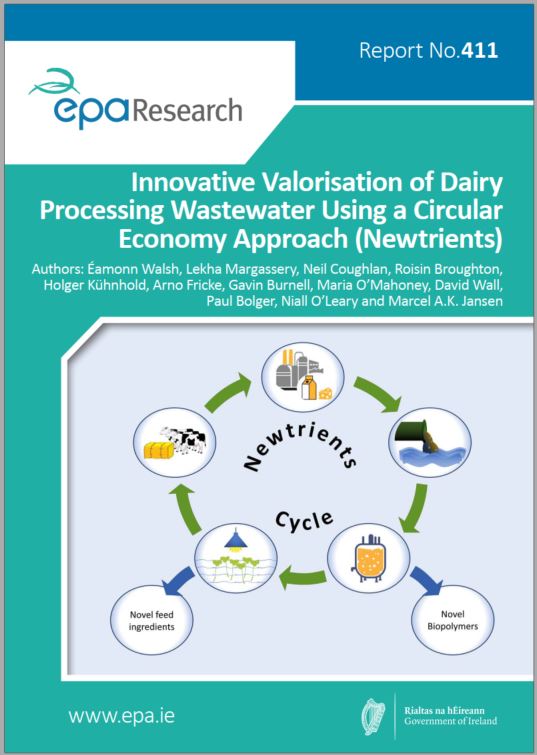
Authors: Éamonn Walsh, Lekha Margassery, Neil Coughlan, Roisin Broughton, Holger Kühnhold, Arno Fricke, Gavin Burnell, Maria O’Mahoney, David Wall, Paul Bolger, Niall O’Leary and Marcel A.K. Jansen, June 2022
Year: 2022
There are pressing economic and environmental concerns regarding the imbalance between resource consumption and regeneration. This research successfully demonstrated a paradigm shift in how wastewater is treated by developing a pioneering cascading system for valorisation of dairy wastewater, based on circular economy principles. It successfully developed an integrated system coupling microbial-based technologies of anaerobic digestion and aerobic dynamic feeding with duckweed cultivation.
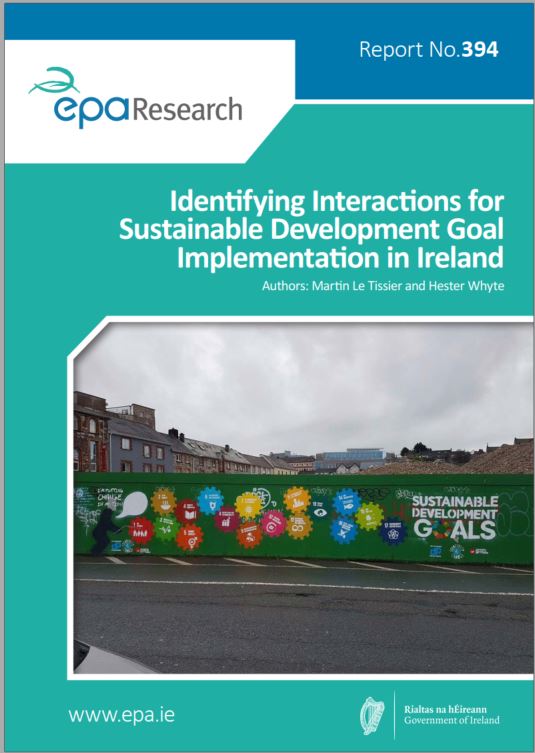
Authors: Martin Le Tissier and Hester Whyte, October 2021
Year: 2021
This report addresses how understanding of interlinkages between the Sustainable Development Goals (SDGs) of the United Nations Agenda 2030 and Ireland’s policy portfolio can advance understanding to meeting SDG targets and a “whole-of-government” approach to policy implementation.
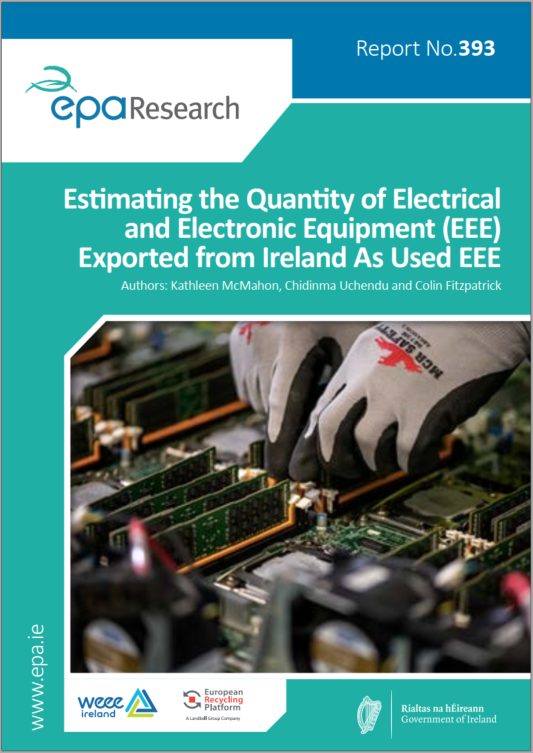
Authors: Kathleen McMahon, Chidinma Uchendu and Colin Fitzpatrick, October 2021
Year: 2021
Ireland has met or exceeded collection and recovery targets for waste electrical and electronic equipment (WEEE) in recent years. However, as targets have risen, Ireland’s stakeholders must identify and address challenges presented by WEEE that does not arise in collection. This research identifies two pathways by which UEEE is exported for the purpose of reuse, namely through the shipment of roll-on roll-off vehicles and through the shipment of professional IT equipment, and it aims to quantify the amount of UEEE exported through each pathway.
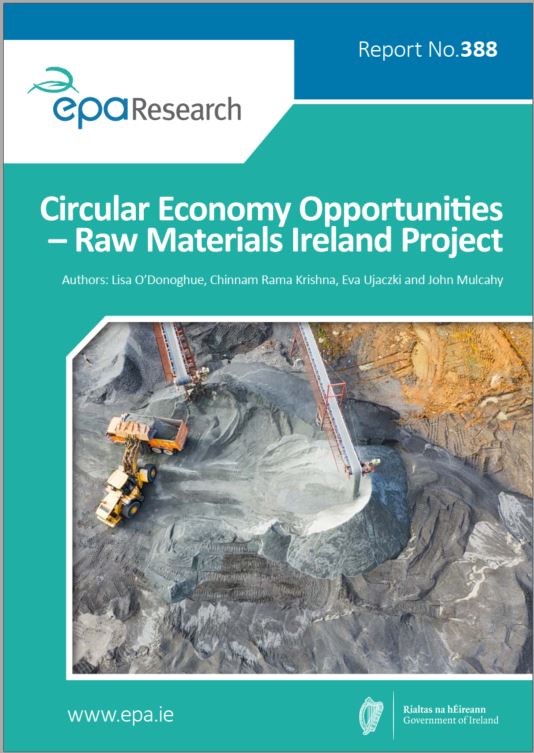
Authors: Lisa O’Donoghue, Chinnam Rama Krishna, Eva Ujaczki and John Mulcahy, August 2021
Year: 2021
Ireland is home to primary industries in mining, materials processing and power generation. Today, most waste outputs associated with these industries are either sent for disposal or exported. The research focused on techniques for mechanical and physical separation, to unlock valuable materials such as iron, aluminium, calcium and critical raw materials (gallium, indium and phosphorus).
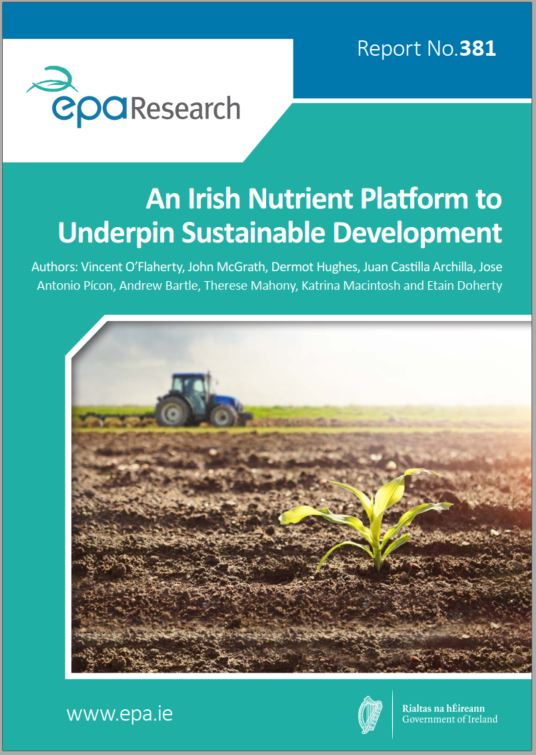
Authors: Vincent O’Flaherty, John McGrath, Dermot Hughes, Juan Castilla Archilla, Jose Antonio Pícon, Andrew Bartle, Therese Mahony, Katrina Macintosh and Etain Doherty, June 2021
Year: 2021
The UN Agenda for Sustainable Development consists of 17 Sustainable Development Goals (SDGs), underpinned by 169 targets, which aim to “end poverty, protect the planet and ensure prosperity for all”. These SDGs are expected to frame national policy agendas over the next 15 years in the context of both domestic and international policy, with an overarching desire to link environmental sustainability to sustainable economic development and the recognition that the management and protection of the environment are vital to economic wellbeing and a healthy society.